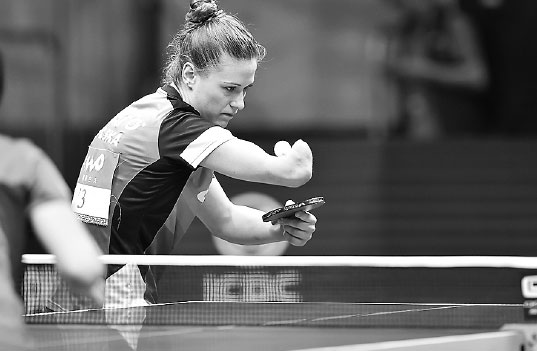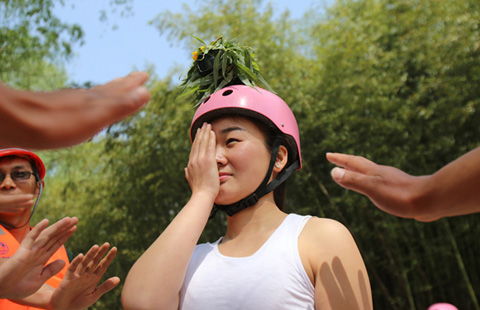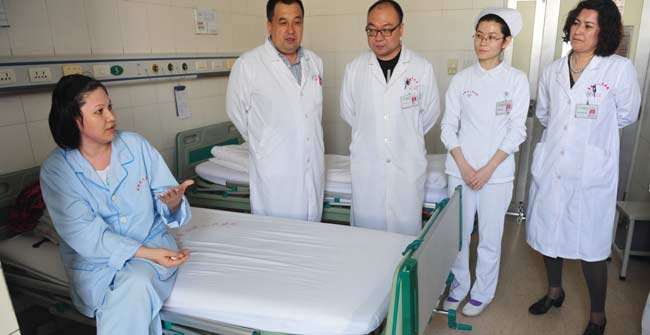Polish star setting new standards for disabled
By Sun Xiaochen in Suzhou, Jiangsu (China Daily) Updated: 2015-05-01 07:32There are quite a lot of people who are able to play table tennis with disabilities but only a few make it to the high levels of the sport and even less compete against able-bodied world champions.
However, Polish player Natalia Partyka, who was born without her right forearm, has proven nothing is impossible in table tennis as she is one of the very few athletes who have competed at the Paralympics and the Olympics.
The 25-year-old is one of only 12 people to have participated in both Games and the only one to have taken part in at least four Paralympics and two Olympics.
Despite losing to China's world No 1 Ding Ning on Tuesday in the second round of the women's singles at the World Championships in Suzhou, Partyka won over the Chinese audience and media with her commitment to the sport.
"It was more difficult in the beginning because, with the disability, people think it's impossible to play table tennis but I just came to practice. The only thing I was sure of was I wanted to play. I just tried to do this my own way," she told China Daily after her loss to Ding.
Partyka began playing table tennis at 7; motivated by the desire to beat her older sister, Sandra. She then started to practice with her sister regularly at a local club in Gdansk and sometimes played at home on the kitchen table, bouncing a ball against the wall.
"At the beginning, I had no chance against her. Every time I wanted to beat her, I ended up failing, so I just wanted to try harder. I enjoyed that from the beginning. Later on, I wasn't even thinking about other sports. I knew it was the thing I'd love to do in the future."
At 11, Partyka became the youngest athlete to participate in the Paralympic Games at Sydney 2000.
Though she lost in Sydney, Partyka came back to win her first Paralympic gold medal in class 10 singles at Athens in 2004 and won again at Beijing 2008 and London 2012.
After achieving a golden three-peat at the Paralympics, Partyka has set her sights on more challenging goals.
"I won everything there, so I want to play with able-bodied athletes here with more difficulty. They are playing much better, so I know I have to improve. Maybe I can't achieve top 10 or 20, but top 40 I can try," said Partyka, who is ranked 73 in the sport.
Partyka's coach, Michal Dziubanski, is full of praise for his student.
"Natalia is a special girl, we are all very happy that she has a sport she likes and she is trying to make the best in her life. She is a great sportsperson. All Polish men are proud of her for what she's done on the international stage," he said.
Boasting an inspirational story and a marketable look, Partyka is a star in Poland with continually growing numbers viewing her personal website and official account on Facebook as well as YouTube.
"It feels good if people recognize me on the street and tell me they like my game. But my goal is not getting popular but improving my game," she said.
Partyka's dedication to the sport also won over her Chinese opponent.
"I really admire her strong willpower over her physical disability. So I show her full respect by studying her techniques and styles seriously before and fighting to my utmost against her in the game," said Ding.
sunxiaochen@chinadaily.com.cn
|
Poland's Natalia Partyka, born without a right forearm, serves by holding the ball in her arm crook during her singles match against world No 1 Ding Ning of China on Tuesday. Zheng Jun / for China Daily |
- Two killed, three injured in amusement park accident
- China's cyberspace 'vulnerability' exposed by attack
- Three nations drafting an action plan to fight pollution
- China to control sex ratio of newborns
- The new king of the swingers
- China's migrant workforce ages, sparking economists' concerns
- Chinese scientists discover 'batman dinosaur'
- Vancouver property developer identified
as Chinese fugitive: report - Three villagers killed close to
DPRK border - Police hunt kidnappers who
fled with $3.6m








